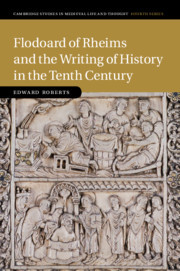Description
Flodoard of Rheims and the Writing of History in the Tenth Century
Cambridge Studies in Medieval Life and Thought: Fourth Series
Author: Roberts Edward
A major re-assessment of the Frankish historian Flodoard of Rheims, one of the tenth century's most intriguing but neglected narrators.
Language: English
Subject for Flodoard of Rheims and the Writing of History in the...:
Approximative price 30.28 €
In Print (Delivery period: 14 days).
Add to cart
Flodoard of Rheims and the Writing of History in the Tenth Century
Publication date: 06-2021
Support: Print on demand
Publication date: 06-2021
Support: Print on demand
Approximative price 107.80 €
In Print (Delivery period: 14 days).
Add to cart
Flodoard of Rheims and the Writing of History in the Tenth Century
Publication date: 09-2019
280 p. · 16x23.5 cm · Hardback
Publication date: 09-2019
280 p. · 16x23.5 cm · Hardback
Description
/li>Contents
/li>Biography
/li>
Flodoard of Rheims (893/4?966) is one of the tenth century's most intriguing but neglected historians. His works are essential sources for the emergence of the West Frankish and Ottonian kingdoms in the tumultuous decades following the collapse of the Carolingian empire in 888. Yet although Flodoard is a crucial narrative voice from this period, his works have seldom been considered in the context of the evolving circumstances of his turbulent career or his literary aims. This important new study is the first to analyse and synthesise Flodoard's entire output, suggesting that his writings about Rheims, contemporary politics and the Christian past have until now been taken at face value without regard for his own intentions or priorities, and therefore have been misunderstood. Edward Roberts' re-evaluation of the relationship between political participation, historical understanding and authorial individuality casts important new light on the political and cultural history of tenth-century Europe.
Introduction: Flodoard of Rheims and his world; 1. Flodoard, his archbishops and the struggle for Rheims; 2. Narrative and history in the Annals; 3. Institutional history and ecclesiastical property; 4. History, poetry and intellectual life; 5. Flodoard's age of miracles; Conclusion: history and historiography in the tenth century.
Edward Roberts is Lecturer in Early Medieval History at the University of Kent, Canterbury where his research focuses on the political and cultural history of the Carolingian empire and its successor states. He has previously held positions as a postdoctoral researcher at King's College London and the Universidad del País Vasco, and as a Leverhulme Trust Early Career Fellow at the University of Liverpool. He is the author of articles in Early Medieval Europe, the Journal of Medieval History, Cahiers de Civilisation Médiévale and Historical Research. His first article was awarded the Early Medieval Europe Essay Prize in 2015.
© 2024 LAVOISIER S.A.S.




